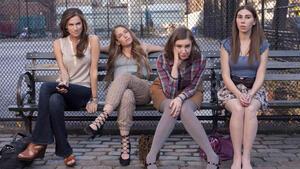Jewish "Girls" Privilege and Marginality
Way back in 2012 when Lena Dunham’s Girls first aired, I admired Dunham’s sincere portrayal of broke young women with artistic ambitions. I could barely watch the show without cringing at its painful accuracies. Since then—since the show’s quick rise in popularity, the magazine photo shoots and Adam Driver’s Gap advertisement, Dunham’s perspective seems more stylized than real. Film and television portrayals of the lives of struggling twenty-somethings feel increasingly less unique and my experiences as a woman of the Girls generation—going to Brooklyn bars in a crop top etc.—feel aspirational and contrived.
After graduating from an Upper East Side Modern Orthodox high school, my friends attended liberal arts colleges, moved to Brooklyn, and pieced together odd jobs while trying to work as journalists and artists. Some work for non-profit organizations, where they advocate on behalf of the marginalized populations whose neighborhoods we have overtaken in our search for affordable rent. In short, we’ve become part of a “Girls scene.” Last month, we went to a birthday party for our old high school classmate. We left after a half hour, feeling unsettled after an onslaught of where-do-you-live and what-do-you-do questions. “I live in Brooklyn,” my friend told an Upper-West-Side resident. “Brooklyn?” she replied, “Like in Girls? Yeah you could pull that off.” My friends moved to Brooklyn because it was (marginally) less expensive, not because it was cool. But then again, it’s also cool.
The typical “Girls scene” is laden with selfishness, privilege and entitlement. It has an element of intrigue and envy and of internal confusion and shame at the unacknowledged fortune of those involved. People who find themselves acting out a “Girls scene” are not predominantly Jews, but the show itself has a disproportionate number of Jewish actresses playing Jewish characters, like Lena Dunham and her costars Zosia Mamet and Jemima Kirk. The Girls phenomenon places Jewish women at the center of a conversation about whiteness and privilege. I have been waiting for a conversation that touches on the complexities of being a young Jewish woman in a diverse urban environment. Is there something about being Jewish that complicates the state of being white and privileged? For my friends and me, who grow up with a strong sense of Jewishness and being apart from mainstream society, the idea that we are white, privileged and mainstream (even while trying to work as artists) comes as an uncomfortable realization. Just as uncomfortable is the realization that one can be broke and privileged at the same time.
Abbi Jacobson and Ilana Glazer’s new series, Broad City, which premiered this January on Comedy Central, addresses its main characters’ Jewish identities as well as the ethnic and economic diversity of New York City. Broad City, like Girls, is a show about the economic and romantic struggles of twenty-something women living in the outer boroughs of New York City.
Abbi and Ilana, the two main characters in Broad City, are no more enlightened and no less selfish than the characters in Girls, yet the writers of the show contrast their concerns with the greater suffering that surrounds them. Abbi and Ilana live in a New York where homeless men are always within earshot of their conversations and trivial complaints about overpriced drinks at concerts. Much of the humor of the show draws on the discordance between the characters' sense of middle class privilege and actual economic destitution. Abbi is a visual artist who dreams of teaching a spin class at the upscale gym where she cleans toilets. Ilana reluctantly shows up for work at an uninspiring start-up that forgets to distribute paychecks. Despite their lackluster careers and overdrawn bank accounts, an older woman on the street accuses the women of being yuppies. In one episode the women attend a socialite rooftop party in a trendy part of the city. In the next, they're shown eating bagels out of garbage bins and stealing fancy lotion in plastic bags at the gym.
The characters' Jewishness and whiteness are also frequently at the center of the show. “We’re just two Jewesses trying to make a buck” Ilana proclaims in a Craigslist ad intended to raise money for a pop-up Lil Wayne concert. Ilana’s use of the word “Jewess” reminds us of the marginality that continues to accompany being Jewish and female in an era of relative power and prosperity for American Jews at large. In their portrayals of Abbi and Ilana, Jacobson and Glazer begin to complicate what Girls shows of the unilaterally privileged, myopic state of young white Jewish women.







Wow. Thank you for writing this! I've had similar thoughts about both shows. I absolutely love Broad City. As a young, white, privileged Jewish woman, it is both familiar and discomforting to watch these 'versions of myself' portrayed on the screen. It would be nice to see a show (or an episode) that addresses the complexities of Jewish identity in a secular culture - interfaith relationships, keeping Shabbat vs. going out to a Friday night concert, etc.
In reply to <p>Wow. Thank you for writing by Rachelpenina W…
Both shows are a gross, unfortunately accurate display of the 21st century woman. Women like to use patriarchy or whatever form of victim-hood is chic as a scapegoat, when in reality they have no respect for themselves - men are wising up and leaving them. And I'm not sure why so many modern comedies disproportionately focus on Jewish people, considering you are a very small minority. Certainly, over-represented.